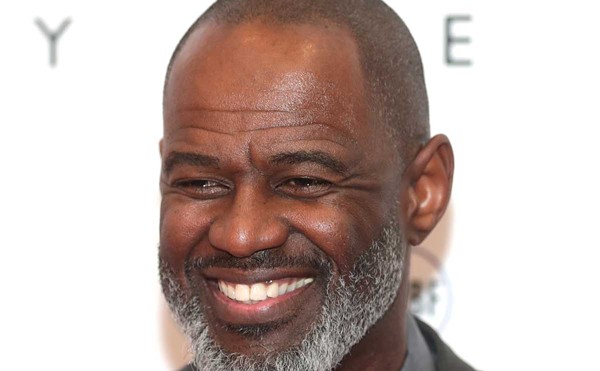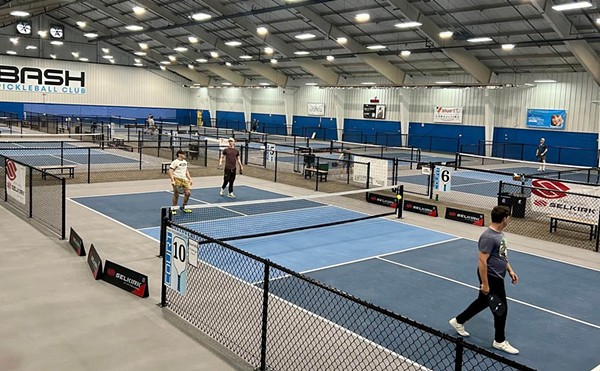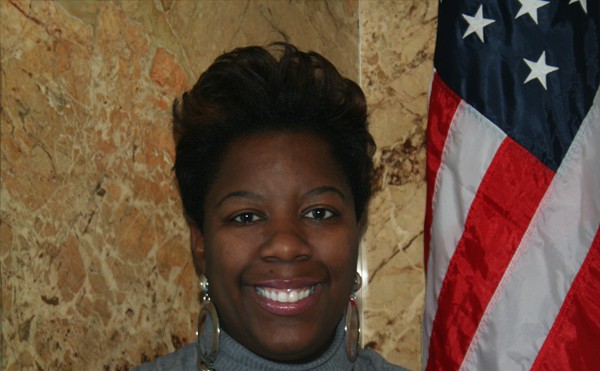Samuel Page Sr. stands outside his tidy brick home on Annabelle Street pulling weeds from the cracks of his cement driveway. The quiet street in the Boynton community on Detroit’s far southwest side is lined with dozens of lovely one-story and bungalow brick houses with edged lawns and cascading flowers.
Page has lived here for more than two decades and has no plans to move. Like him, most folks on Annabelle Street are retired, says the 50-year-old former autoworker.
“In the 25 years I’ve lived here, only one or two homes sold on my block,” says Page. “Nobody’s going anywhere.”
Though content, Page and others say there is room for improvement in this nearly crime-free area that borders River Rouge. They want more police, bus lines and recreation areas. And they hope that Detroit’s next mayor will heed their requests.
But this is not the only neighborhood clamoring for attention. Metro Times visited three Detroit communities asking residents what they want most from the next mayor. Regardless of where folks reside — whether in upscale Rosedale Park, Boynton’s mix of rough and serene streets or the solid middle-class homes of East English Village — most trumpet the same plea: “Take care of the neighborhoods.”
It’s an old mantra. For years Detroiters have complained that too much money is invested downtown while neighborhoods are neglected. Former Mayor Coleman Young was widely criticized for focusing on the city’s business district and riverfront. And though Mayor Dennis Archer made cleaning up the neighborhoods a cornerstone of his first campaign, eight years, three casinos and two stadiums later, some residents feel duped.
Predictably, the current mayoral candidates are touting plans for turning around the city’s neighborhoods. Of course, no one knows if the winner of this race will make good on his promises. What is certain is that folks like Page are tired of being ignored.
Down south
Dorothy Hill sits on her front porch with her granddaughter enjoying a rare cool summer day. Like her longtime neighbor Page, the 74-year-old woman says that for the most part, her community is in good shape.
“We don’t have problems in this neighborhood,” says Hill.
But most Detroit neighborhoods are not like hers. In another section of Boynton, about a half-mile or so from the retired health-care worker’s home, abandoned homes and buildings pepper the streets and thoroughfares. Hill says she wants the next mayor to tear down the dilapidated structures or transform them into recreation centers.
“Lots of abandoned buildings are going to waste,” she says.
Some living in the troubled parts of Boynton say that more than buildings have been abandoned. On Omaha Street two broken-down cars sit in an empty field where houses once stood. Behind her steel-barred door, Elsie Burks says that the city moved the abandoned cars from the street to the grassy lot when it paved the road several months ago. The retired nurse’s assistant says that she called the city to have the cars removed but it never responded.
Burks stopped voting years ago, and says she doesn’t expect much from the next mayor. According to her, it is up to the citizens to take care of their communities.
“We have to do that ourselves,” she says.
Arthur Kyner, who lives a street over from Burks, knows better than most about tending to his neighborhood. The 77-year-old retired foundry worker was his block club’s president for years before his daughter recently took over the post.
“We make sure we watch each others’ homes and kids and take care of the property,” says Kyner, who has a “Keep Detroit Beautiful” sign in his front yard, as do a few of his neighbors. The homes on this street are not as worn as those on Burk’s, and it doesn’t have the same rough-edged feel. Maybe Kyner and his neighbors’ efforts are paying off.
But the agile man, who worked on several of Coleman Young’s mayoral campaigns, understands that responsibility for keeping up the neighborhoods does not solely rest with the citizens.
He is looking to the next mayor to provide more bus lines, keep the streetlights on and improve the recreation center where seniors regularly gather for meals and play cards.
“Oh, yeah, and we need to get rid of the crack,” says Kyner. “That’s a big one. It’s scary around here for the seniors.”
But there doesn’t seem much hope for that happening without a stronger police presence, which is also lacking, he says.
“Have you seen a cop here since you been in the area?” says Kyner.
The answer is no. In the two afternoons spent in Boynton, we did not see a single patrol car. Even Joe Fields, who does volunteer work every Tuesday at the police mini-station on Schaefer, says he rarely sees a police officer in the station or the community.
“They say police ride in the neighborhood, but we don’t see it,” says Fields.
Uptown
On Detroit’s northwest side, tall trees shade elegant brick homes and beautifully landscaped boulevards. This is Rosedale Park, one of the city’s few well-to-do neighborhoods, where such notables as former deputy mayor Freman Hendrix and City Council President Pro Tem Maryann Mahaffey reside. It is also made up of regular folks who can afford to move to the suburbs but don’t because they are committed to Detroit, says Kathy Garrett, an English instructor at Wayne State University.
Garrett and her husband, Rick, who is an electrician, want to raise their three children in the city because the neighborhood is diverse.
“And not just racially,” she says; it is also made up of people from different economic and religious backgrounds.
But Garrett’s view of Detroit stretches beyond Rosedale Park. Asked what she wants from the next mayor, she ticks off a list of suggestions that if followed would benefit every neighborhood and city dweller: Increase the tax base, improve the school system and public libraries and pave the roads.
What she finds disheartening is that friends and neighbors have been clamoring for these same improvements for years. After seeing little results, they left, says Garrett.
“It breaks my heart,” she says. “I have lots of friends who moved away, community-involved people, but they’re sick of it.”
Detroit police officer Mike Russell says high property taxes are driving him out of the city. He would like to see the next mayor ease the tax burden by bringing in more businesses. But the 32-year-old cop does not want them clustered downtown, where he says Archer focused most of his energy.
And though Russell admits that he is better off now than he was eight years ago when Archer took office, with more income from his side job as a builder, he knows that other Detroiters are not doing as well. He wants the inner-city neighborhoods cleaned up.
“They shouldn’t have trash on the curbs, illegal dumping. And take down the abandoned houses,” he says.
The bottom line, says Russell, is providing the public with basic city services including recreation centers “for kids so they’re not stuck out on the streets.”
Like Russell and Garrett, Burt Carp is not as concerned with Rosedale Park as he is with the rest of Detroit.
“We have our share of city services,” says the 59-year old retired social worker. “I would like to see other neighborhoods get fixed.”
But he is not convinced that a change in leadership will make a difference. Detroit is entrenched with generations of poverty and the depression and low self-esteem that comes with it, says Carp.
“I don’t think one person can fix it,” he says.
It takes a village
Crystal Watson sits on her front porch in East English Village, a stable, middle-income community bordering Grosse Pointe and home to many police officers, fire fighters and other civil servants. Watson, a registered nurse, has a slew of suggestions for the next mayor, much like the lists of others interviewed for this story: More recreation centers, tearing down abandoned homes and cleaning up the struggling neighborhoods. Watson’s list is also not much different from what people have been saying they want for Detroit for decades.
“We have been hearing the same thing ad nauseam for 30 years and nothing has happened yet,” says Bill Ballenger, editor of Inside Michigan Politics.
“I would still say that the threshold in this area is so low that anything done could be an improvement.”
According to a recent poll of 300 likely voters that the Detroit Regional Chamber of Commerce and Detroit Renaissance commissioned, neighborhood blight was identified as the second-most-important problem facing the city; crime and drugs was No. 1. Ballenger says that an entrenched city bureaucracy has made it difficult to get the city on track. He places some of the blame on Archer.
“Quite frankly, Archer did not show the kind of tough negotiation skills with the unions that he or the next mayor needs.”
Political analyst Mario Morrow suggests that the next mayor take a stronger tack with city workers.
“I think one of the keys is some form of privatization,” says Morrow. “The next mayor has to be bold enough to say there is room for privatization to bring back the core of the community, which is the neighborhoods.”
Though longtime East English Village resident Geoff Gowman is a big Archer booster, he says that little has been done to improve the neighborhoods. In fact, Gowman, a retired social worker, says that the most important qualification that the next mayor should possess is the will “to restore the quality of life in inner-city neighborhoods.”
Gowman says that his community is in better condition than most, but he is doing his part to improve it. He and a group of other residents are helping restore the Alger Theater on Warren, about six blocks from his home. They hope to show films and hold events there.
But he knows that it will take more than a neighborhood theater to keep people in Detroit and attract new residents.
“We lost a tremendous number of families in this neighborhood when kids became high-school age and (their parents) couldn’t afford private school,” he says.
Gowman went a different route when his two daughters reached high-school age. He rented out his home, moved to Grosse Pointe, then returned to Detroit when they graduated.
This is not the first time Gowman has tried to do right by the city. In 1985 he ran for mayor against Coleman Young. Though he knew he didn’t stand a chance, he wanted to raise issues that he thought Young neglected — like the neighborhoods. Out of 13 candidates, Gowman came in a very distant fourth.
Read six candidates' responses to neighborhood concerns.
Listen in on Jack Lessenberry's conversation with a Detroiter who voices her concerns before this incredibly important election.
Ann Mullen is a Metro Times’ staff writer. She can be reached at [email protected]. Editorial intern Peggy Geeseman contributed to this




